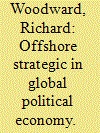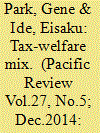| Srl | Item |
| 1 |
ID:
054167


|
|
|
| 2 |
ID:
075686


|
|
|
| 3 |
ID:
004321


|
|
|
|
|
| Publication |
Paris, Nuclear Energy Agency, OECD, 1993.
|
| Description |
245p.
|
| Standard Number |
9264138242
|
|
|
|
|
|
|
|
|
|
|
|
Copies: C:1/I:0,R:0,Q:0
Circulation
| Accession# | Call# | Current Location | Status | Policy | Location |
| 035020 | 333.7924/SAF 035020 | Main | On Shelf | General | |
|
|
|
|
| 4 |
ID:
135073


|
|
|
|
|
| Summary/Abstract |
Despite having the highest level of public debt in the Organisation for Economic Co-operation and Development (OECD), higher than Greece or Italy, Japan has one of the lowest aggregate tax burdens of the advanced industrial democracies. This paper asks why Japan, once described as a strong developmental state, has had such a weak extractive capacity, an inability to raise revenues to confront deficits and public debt? In contrast to the existing explanations that focus on political institutions, partisan preferences, or economic globalization, this article argues that Japan's ‘tax–welfare mix’ – the combination of taxes and redistributive welfare polices – undermined the state's long-term capacity to secure adequate tax revenue. More than just a source of revenue, taxes can be used directly to achieve redistributive goals, such as targeting low taxes and exemptions to specific groups. This study shows how Japan's tax–welfare mix diminished its extractive capacity through three mechanisms: the political lock-in of a redistributive social bargain struck around low taxes, the timing and sequencing of its tax policy and welfare development, and the erosion of public trust, which undermined tax consent. Beyond offering a new theory of extractive capacity, the tax–welfare mix explains aspects of Japan's tax structure that defy existing explanations and contributes to our understanding of the capitalist development state by highlighting the redistributive political function of tax policy and its long-term impact on state capacity.
|
|
|
|
|
|
|
|
|
|
|
|
|
|
|
|